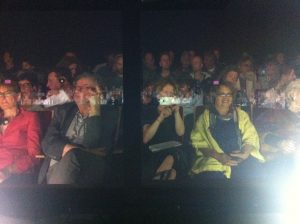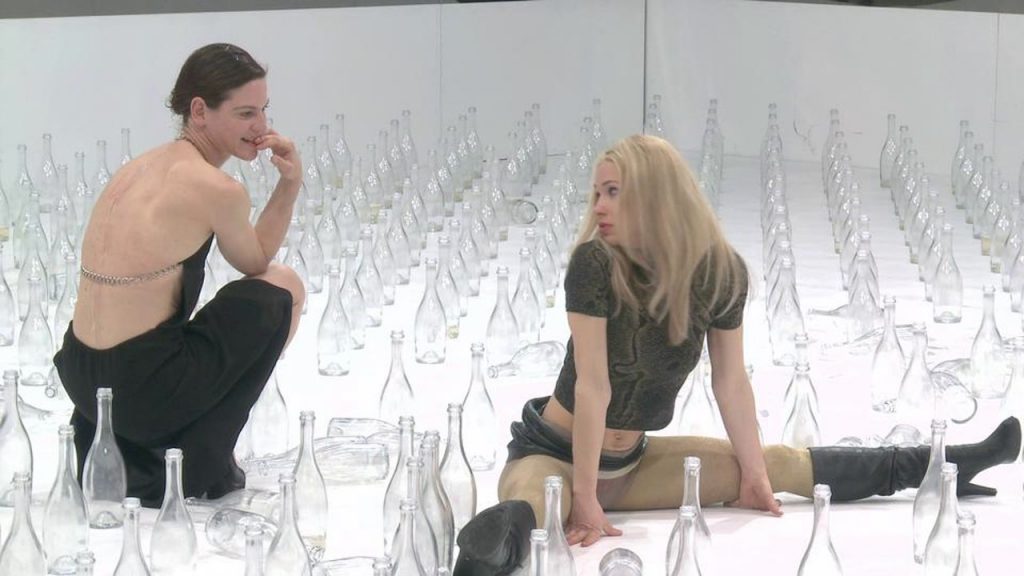Nice 'old-fashioned' Holland Festival: a special set-up that confronts the audience with the implications of their own position and viewing behaviour. And that's just as well with Fassbinder's 'Die bitteren Tränen der Petra von Kant'. Melodrama was no stranger to the German theatre and film wizard. The bitter tears are of a fashion queen and her entourage, clinical is the setting, wafer-thin the story, and yet unusually exciting how this lady drama develops.
Clean as only Germans consider chic, moreover in too high heels and too tightly coiffed - kitsch is the word for the stage setting, or über-aesthetic. But the white box with window wall all around, giving the audience not only a view of the floor, but also an extended look at themselves and each other at every stroke of darkness, does more. Director Martin Kušej and scenographer Annette Murschetz seem to be a combination of "The Anatomy Lesson" of Rembrandt and Ridley Scott's "Gladiator" in mind, when they designed this theatre-arena anatomy. The actors were around it like animals in a ring, but the spectators too are locked up, in their lodges.
As if the seclusion of the director's booth has been opened up to audiences who want to experience a day of 'TV behind the scenes'. A viewing and listening game it is. The plastic glazing moves dangerously as the actresses watch the ubiquitous fourth wall looking up, but keeps the audience neatly at bay. Even the text is mediated, amplified through the installation and in translation via headsets, to the audience. Safe distance, monkey watching, everything is 'live' about this event, but it remains second-life.
 Against all this, the actresses in "Die bitteren Tränen ..." play as if their lives depended on it. as if their lives depended on it. Solid women, young and radiant most of the time, often squatting on the floor filled with almost empty Sex bottles. The power from the thighs, whether it's about life in high heels, about sexual conquests or about hanging in your own body as armour, is impressive. It could probably also have been five men playing out this suffering of possessing and being possessed, but I don't see them doing that squatting in heels any time soon anyway.
Against all this, the actresses in "Die bitteren Tränen ..." play as if their lives depended on it. as if their lives depended on it. Solid women, young and radiant most of the time, often squatting on the floor filled with almost empty Sex bottles. The power from the thighs, whether it's about life in high heels, about sexual conquests or about hanging in your own body as armour, is impressive. It could probably also have been five men playing out this suffering of possessing and being possessed, but I don't see them doing that squatting in heels any time soon anyway.
Something all too human clings to the story of blind love and manipulation. Fassbinder's play, from 1971 but still very popular, also does nothing but show the bitterness. No attempt is made to explain the emotional abuse and betrayal transferred from mother to daughter. Something stupid has it therefore, with people locked together who can only fight each other to pieces and then cry out loudly sorry in between.

The laboratory is their habitat, tell that to a good pair of actors and a director. They can let the underbelly rule uncommonly and credibly combine lapping despair, vile excuses and silent resignation into daily fare. Intense and physical is the play, though it remains almost small or at least very close to the actresses' skin. The ego kicks around, the power of imagination rules and Petra von Kant faces a certain doom. Her imagination rules and nothing or no one knows how to break through it. The performance therefore also has something unreal: the text is from a time when yoga and mindfulness had not yet begun their rise and self-medication through drink and drugs was still bon ton. Screaming loneliness was still deliciously irrevocable.
You can still get on the waiting list. The final performance, to be seen tonight at the Muziekgebouw aan het IJ, is sold out.
Otherwise, the website of the Residentztheater perhaps outcome.
Fassbinder's Die bitteren Tränen der Petra von Kant
